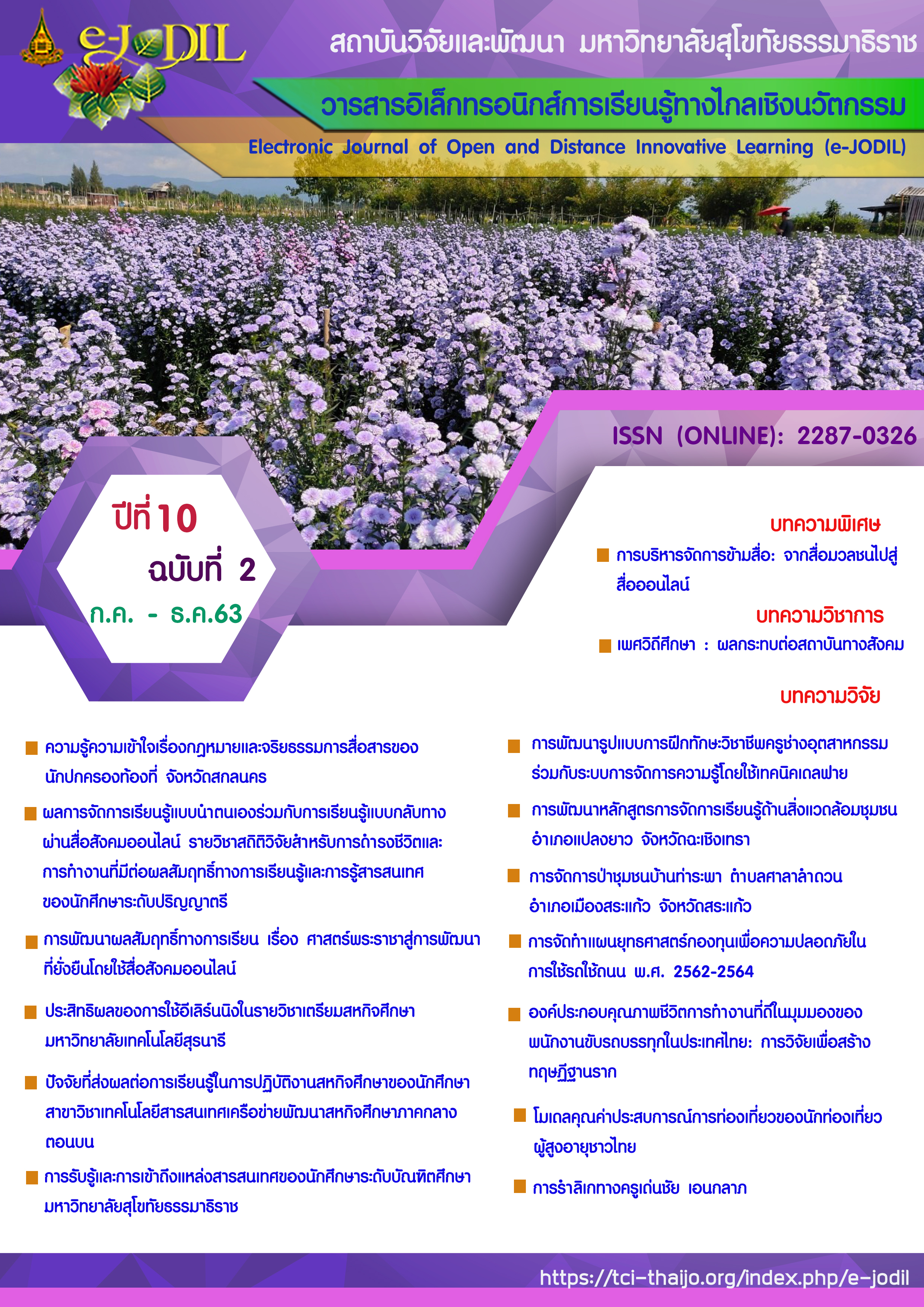การบริหารจัดการข้ามสื่อ: จากสื่อมวลชนไปสู่สื่อออนไลน์
Main Article Content
บทคัดย่อ
สามทศวรรษที่ผ่านมา การจัดการสื่อเผชิญกับสภาพความปั่นป่วนซึ่งน่าหวาดหวั่นทั้งนี้เนื่องมาจากการเปลี่ยนแปลงนวัตกรรที่ก้าวกระโดดอย่างรุนแรง ด้วยเหตุนี้เงื่อนไขของสื่อโดยเฉพาะอย่างยิ่งสื่อดั้งเดิมที่เติบโตช้ามากและอย่างค่อยเป็นค่อยไปต้องล้มหายจายจาก อันจำเป็นต้องมีการจัดการให้มีการเปลี่ยนแปลงอย่างก้าวกระโดดตามนวัตกรรมที่ถาโถมเข้ามา ซึ่งในไม่ช้าการจัดการสื่อดั้งเดิมจะดิ่งลงเหวไปกับการล้มละลาย ในช่วงเวลาแห่งการเปลี่ยนผ่านจากผลกระทบของนวัตกรรม การผลิตและการให้บริการเนื้อหาจะถูกกระตุ้นอย่างรุนแรงด้วยการแทนที่จากการเติบโตที่รวดเร็วของสื่อใหม่ แนวทางการศึกษาสื่อทางกายภาพเช่นในคลื่นลูกที่หนึ่งและที่สองจะถูกกลืนกินโดยสื่อใหม่จากการที่สื่อดั้งเดิมขาดความยืดหยุ่นและมีภาวะที่สถิตและคงที่โดยไม่สามารถเคลื่อนไปตามกระแสของการเปลี่ยนแปลงนวัตกรรมของโลก การจัดการสื่อไทยไม่ได้แตกต่างไปจากประเทศอื่น ๆ ที่พยายามหาช่องทางเพื่อก้าวให้ทันกับวิกฤตการณ์ความอยู่รอดโดยอิงกับโมดูลทั้งสี่ดังต่อไปนี้ 1 การจัดการสื่อแบบดั้งเดิม 2. สื่อดั้งเดิมที่พยายามเลียนแบบเนื้อหาของสื่อใหม่ 3. การโอนย้ายสื่อดั้งเดิมไปเป็นสื่อใหม่ และ 4. การการจัดการสื่อใหม่อย่างเต็มตัว
Downloads
Article Details
บทความ ข้อความ ภาพประกอบ ตารางประกอบ ที่ตีพิมพ์ในวารสารเป็นความคิดเห็นและความรับผิดชอบของผู้เขียนแต่เพียงผู้เดียว ไม่เกี่ยวข้องกับมหาวิทยาลัยสุโขทัยธรรมาธิราชแต่อย่างใด
บทความที่เสนอพิจารณาในวารสาร e-JODIL ต้องเป็นบทความที่ไม่เคยส่งไปลงพิมพ์ เผยแพร่ หรืออยู่ระหว่างการพิจารณาของวารสารอื่น
กองบรรณาธิการขอสงวนสิทธิ์ในการพิจารณาและตัดสินการตีพิมพ์บทความในวารสาร
เอกสารอ้างอิง
วิรัตน์ แสงทอง. (2561, 24 มกราคม). สื่อกับสังคมไทย. มติชนสุดสัปดาห์.
สุรพงษ์ โสธนะเสถียร (2559). การบริหารงานสื่อสารมวลชน. กรุงเทพฯ: ห้างหุ้นส่วนจำกัดประสิทธิภัณฑ์แอนด์พริ้นติ้ง.
สุรพงษ์ โสธนะเสถียร. (2560). ทฤษฎีการสื่อสาร. กรุงเทพฯ: โรงพิมพ์ระเบียงทอง.
Cavis, A. (2015). 4 Ideas for Innovative Media Relationship Building. December 3, 2015.
Chan, D. (2018, 20 April). Mass communication: 8 Things to know about it. Digital Media.
Chartbeat Quarterly. (2014). Quarterly, 1(Fall). from http://bit.ly/1APBoi9.
Chyi, H.I. & Tennant, J.I. (2017). Transnational Media Management: Western News Organizations’ Web Operations in China. International Journal on Media Management, 19(4), 261-81.
Doyle, G. (2010). From Television to Multi-Platform: Less from More or More for Less? The International Journal of Research into New Media Technologies, 16(4), 431-449. from http://con.sagepub.com.
Guzman, A. (2016, April 7). 6 Ways Social Media is Changing The World. World Economic Forum Eva Pereira. 2016. “11 innovative media and information projects receive support from Knight Prototype Fund.” technology / Article. February 23, 2016.
Haataja, M., Hyvärinen, J. & Laajalahti, A. (2016). Expert Views on Current and Future Use of Social Media among Crisis and Emergency Management Organizations: Incentives and Barriers. Human Technology, 22(2), 135-164.
Harding, J. (n.d.) Future of News. Retrived May 9, 2018. from http://www.bbc.co.uk/news/resources/idt-bbb9e158-4a1b-43c7-8b3b-9651938d4d6a.
Henderson, L.S. (2008). The Impact of project managers’ communication competencies: Validation and Extension of a Research Model for Virtuality, Satisfaction, and Productivity on a Project teams. Project Management Journal, 39(2), 48-59.
https://www.mangozero.com/thai-print-in-2016/
https://www.matichon.co.th/economy/news_422188
Innovative Media Tactics Offer Ideas for Growing 2017 Circulation. (2017) from http://www.acculistusa. com/innovative-media-tactics-offer-ideas-for-growing-2017-circulation/
King, L. (2007). Does Media Management Matter? Establishing the Scope, Rationale, and Future Research Agenda for the Discipline. Journal of Media Business Studies. 4(1), 21-39
Libert, B., Beck, M. & Jerry, Wind (Yoram). (November 18, 2016). How Platforms Will Disrupt the Future of Media and Entertainment. Innovation.
Mierzejewska, B.I. (2010). Media Management Theory and Practice. In Deuze, Mark (ed.): Managing Media Work. Thousand Oaks, California: Sage.
Natalie, J.S. (2015, 8 September). Managing Change within News Organization. American Press Institute. Published
Normahfuzah, A. (2017) The Decline of Conventional News Media and Challenges of Immersing in New Technology. eSharp, 25(1), 71-82 from https://www.gla.ac.uk/media /media_529633_en.pdf.
Oliver, J.J. (2003). Media Management tools: UK Broadcast Media Executives’ Perspective. International Journal on Media Management, 15(4), 245-57.
The new media revolution. (2012). SCENARIO. from http://cifs.dk/presentations/speakers/anders-bjerre/the-new-media-revolution/%20research.html.
Toffler, A. (1980). The Third Wave. New York: William Morrow and Company, Inc.
VALKENBURG, P.M. & PETER, J. (2013). Communication Research Paradigms: Five Challenges for the Future of Media-Effects Research. International Journal of Communication, 7, 197–215


